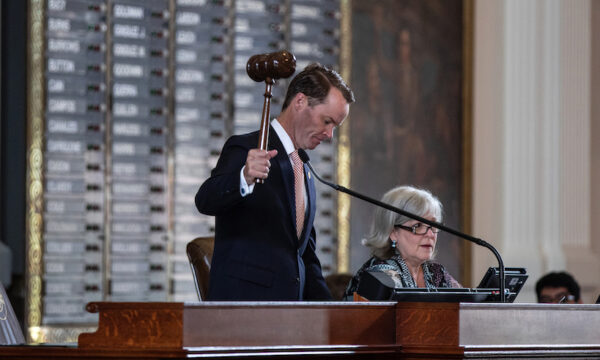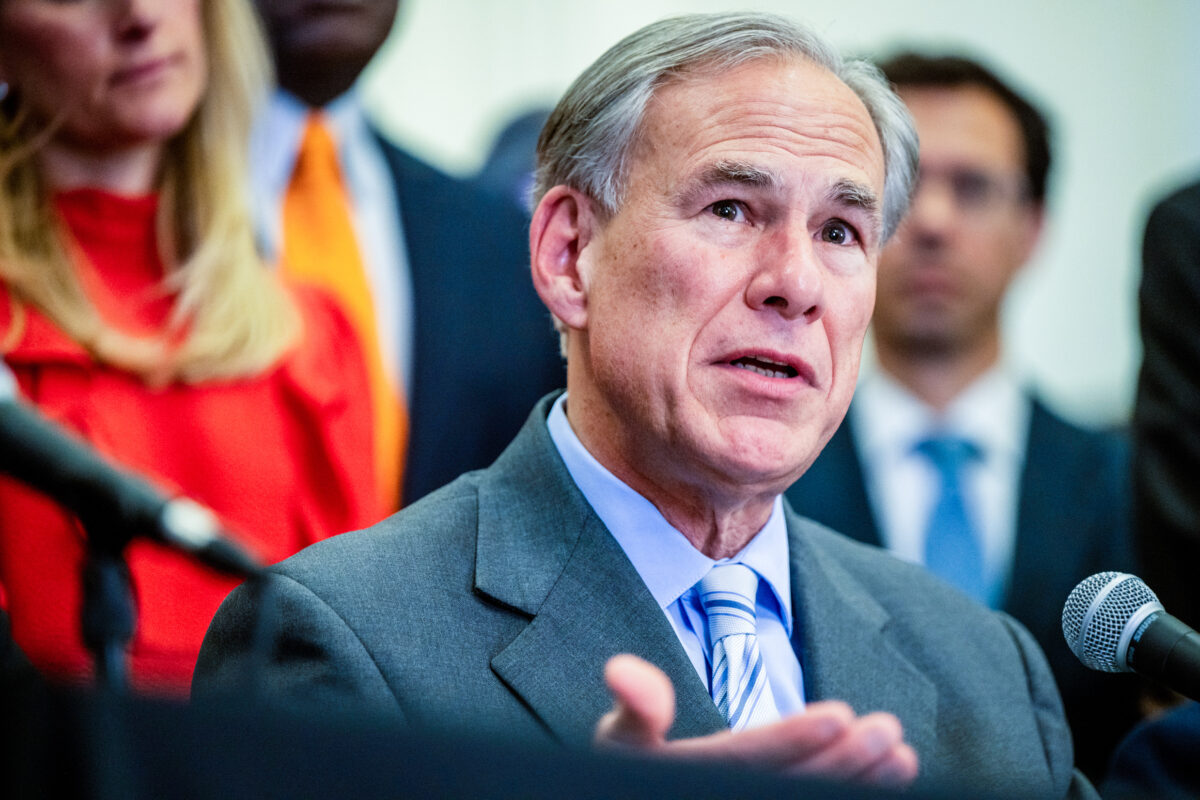Texas Gov. Greg Abbott ordered lawmakers back to work for a second special session after they failed to pass legislation to reduce property taxes.
“I called another special session to deliver on our promise to provide the largest property tax cut in Texas history. Hardworking Texans deserve lasting property tax cuts. When the House [and] Senate come to an agreement [and] send a property tax cut bill to my desk, I will sign it,” Abbott wrote on Twitter Wednesday morning.
The Republican governor’s first special session, which ended on Tuesday, focused on two issues—property taxes and border security—but no deals were made on either issue (pdf). The House and Senate have been embattled over how to direct the $17.6 billion available to cut property taxes for millions of homeowners. Texas has a record budget surplus of $32 billion.
Abbott announced the second session just hours after the first session closed. He narrowed the agenda to property taxes, warning lawmakers that he would continue calling special sessions until a bill reached his desk for signature.
“After yet another month without the House and Senate sending a bill to my desk to cut property taxes, I am once again putting the agreed upon school district property tax rate cuts on the special session agenda. Unless and until the House and Senate agree on a different proposal to provide property tax cuts, I will continue to call for lasting property tax cuts through rate reductions and working toward eliminating the school property tax in Texas. Special sessions will continue to focus on only property tax cuts until property tax cut legislation reaches my desk,” the governor said in a press release.
Abbott listed his two agenda items related to property taxes for the second special session.
- Eliminating a property tax in Texas: Legislation to put Texas on a pathway to eliminate school district maintenance and operations property taxes
- Lasting property tax rate cuts: Legislation to cut property tax rates solely by reducing the school district maximum compressed tax rate in order to provide lasting property tax relief for Texas taxpayers
The governor said his plan is backed by homeowners, consumers, and businesses across the state, including “leading tax policy groups” such as the Texas Taxpayers and Research Association and the Texas Public Policy Foundation.
But Abbott’s agenda makes no mention of increasing the homestead exemption—the issue that Lt. Gov. Dan Patrick insists must be included in the plan to cut property taxes.
Back to Work—for Some Lawmakers
On Wednesday morning, both chambers convened at the state Capitol in Austin.
However, the House session lasted less than 20 minutes.
Speaker Dade Phelan paused proceedings in his chamber minutes after the swearing-in of Fanny Jetton whose is temporarily replacing her husband, state Rep. Jacey Jettton, deployed for service with the Army National Guard. The Texas Constitution allows lawmakers to appoint a temporary replacement when they are called to service. The lawmaker selected his wife to fill in for him.
“Members, it is the intent of the Chair to stand at ease until 10 a.m. Friday, at which point, the House will adjourn at 2 p.m. until Wednesday, July 5,” Phelan said just before gaveling out.

Phelan came under fire from Patrick after he adjourned the House Sine Die, a Latin term meaning “without day,” on the first day of the initial special session after passing the House’s property tax plan that is backed by Abbott.
Meanwhile, the Senate opened its session and returned to work on the task at hand.
The third legislative session of 2023 highlights a series of rough patches for the Republican party in the nation’s most populous red state.
Patrick, who leads the Senate, has been embroiled in a bitter public dispute with Phelan and Abbott over how to bring lasting property tax relief to Texas homeowners.
“Over the last week, there have been many discussions between the Texas Senate and House to find a deal on the largest property tax cut in Texas history. In today’s statement, the Governor said that during the regular session, the House and Senate both agreed on cutting school district property tax rates. He is correct. However, he did not mention that during the regular session, both the House and Senate also unanimously voted for a $100,000 homestead exemption,” Patrick said in a statement on Wednesday.

Reducing property taxes was among Patrick and Abbott’s top priorities during the regular session.
During the regular and first special sessions, the Senate passed a two-part plan that includes the compression of schools’ M&O taxes and increasing the state’s homestead exemption from $40,000 to $100,000 of a property’s value.
Patrick has vowed to continue fighting for the Senate plan, citing it would bring homeowners the most meaningful tax cuts.
“I have been clear that we will not leave Austin without property tax relief targeted at homeowners through an increased homestead exemption to provide them as much relief as possible. Homeowners need proper tax relief right now,” Patrick said in a release Wednesday afternoon after the Senate passed unanimously Senate Bill 1 (pdf) and Joint Resolution 1 (pdf), which is required to amend the Texas Constitution if the bill becomes law.
Before closing the day’s session, Patrick commended Senate members for their “masterful work,” adding, “I can’t think of a better property tax cut bill.”
The Senate amended the previous version of Senate Joint Resolution 1 to include supplemental payments for teachers using a portion of the $17.6 billion set aside by lawmakers for residential and commercial property relief.
“Homeowners, Teachers, and businesses get a giant victory! Homeowners will see their school property taxes decrease by a whopping 43 percent,” Patrick said in a news release Wednesday afternoon.
Patrick said the Senate Bill 1 would provide “the largest property tax cut in Texas history by combining the power of the homestead exemption and compression for homeowners.”
The bill also brings tax relief for businesses through compression and by increasing the franchise tax threshold.
Senate Joint Resolution 1 would put the homestead exemption increase on the ballot. It includes a $2,000 payment to every full-time teacher in Texas. Teachers who work in districts with less than 20,000 students would get an additional $4,000 to help close the pay gap between urban, suburban, and rural teachers.
Last year, Texas voters overwhelmingly approved raising the homestead exemption from $15,000 to $40,000.


















































